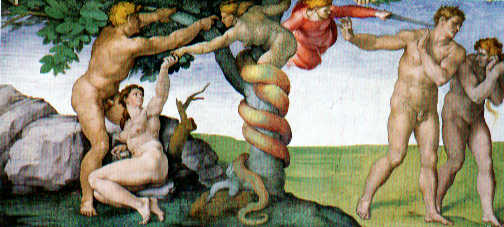Sistine Chapel Ceiling, Michelangeo
Paucapalea (ca. 1150), Prologue to Summa, ed. Johann F. von Schulte (Giessen: 1890, repr. Aalen: 1965) 1:
Placitandi forma in paradiso primum videtur inventa, dum prothoplastus ┌de inobedientiae crimine ibidem a domino interrogatus┐ criminis relatione sive remotione usus culpam in coniugem removisse autumat dicens, "Mulier, quam dedisti, dedit mihi et comedi" (Genesis 3.12). Deinde in veteri lege nobis tradita cum Moyses in lege sua ait: "In ore duorum vel trium testium stabit omne verbum" (Deut. 19:15 and 2 Corinthians 13)
